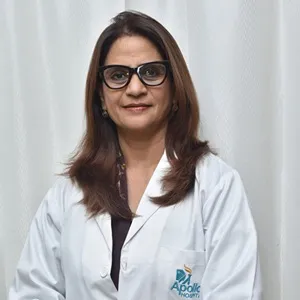Colposcopy is a procedure to get a better picture of the cervix, vulva, and vagina. You might be asked to undergo a colposcopy if your pap test is abnormal. It is non-invasive and can be done as an outpatient procedure. Read the article till the end to learn everything about the procedure.
About Colposcopy
Colposcopy is a non-invasive procedure where your doctor inserts a 'speculum' tube inside your vagina to expand the field of view (of your cervix) and uses a microscope to view the inside of your vagina. During the procedure, if your doctor finds any abnormality in the cell structure or growth, they scrape some cells to test (biopsy).
Colposcopy is usually done when you are not menstruating. Before getting your colposcopy done, you will be asked to refrain from using tampons and medicines and avoid sex for at least a few days.
Who Qualifies for Colposcopy?
Colposcopy is a non-invasive procedure for women in their reproductive and post-menopausal years. When your doctor finds an abnormality in the cells of your cervix during a pap test, you will be asked to undergo a colposcopy to check for infection or cancerous growth due to the Human papillomavirus (HPV).
Why is Colposcopy Done?
Colposcopy is a diagnostic test done if your doctor finds abnormal cells in your pap smear test. It is also done to diagnose infections, inflammation, and other benign or cancerous growth in your vagina, vulva and cervix.
Broadly, colposcopy is done to diagnose the following:
- Genital warts
- Cervicitis or inflammation of the cervix
- Abnormalities in the structure and growth of cells in the vagina
- Abnormalities in the structure and growth of cells in the cervix
If any abnormality is found in the vagina, vulva or cervix, cells are scraped and given for a biopsy to check if it is cancerous or benign.
Benefits of Colposcopy
Colposcopy helps diagnose inflammation or changes in the structure of the cervical cells. It also helps in the diagnosis of STDs.
Risks or Complications of Colposcopy
Being a non-invasive procedure, colposcopy does not cause major discomfort or side effects. Rarely do the following complications arise:
- Bleeding that is heavy and feels like a period following the procedure
- Possible infection, mainly if you use public bathrooms or keep the area wet, following the procedure
- Pelvic pain or discomfort, as severe as you experience while menstruating
- Fever or chills
These are some of the signs that indicate possible complications. You should contact your doctor immediately if you start experiencing any of them. Apollo Cradle and Children’s Hospital has specialized gynaecologists to diagnose and treat any condition.
Request an appointment at Apollo Cradle, Amritsar - Abadi Court Road. Call 1860-500-4424 to book an appointment.
You will be asked to do a colposcopy if your doctor finds an abnormality in the pap test.
Yes. Colposcopy is a non-invasive procedure that is completely safe and does not involve any major complications. It is normal to feel anxious before the procedure, but at Apollo Cradle and Children’s Hospital, we have specialists to answer all your queries and do procedures safely.
No. It does not necessarily mean that you have cancer. Colposcopy provides a clear picture of the cervix and enables your doctor to diagnose infection, warts, inflammation or changes in the vagina, vulva and cervix cells.
It is advised that you schedule your colposcopy when you are not menstruating or using any tampons. You will be asked to avoid taking certain medications and contraceptives. You will also be asked to refrain from having vaginal sex for at least two days before the procedure. Colposcopy is non-invasive and can be done as an outpatient procedure. There are no other precautions to be followed.
Colposcopy is a visualization procedure that helps your doctor have a clear picture of the cervix. Your doctor will use a tube called the speculum to expand your vagina, and a microscope will be used to examine the inside. Clear visualization is enabled with the help of a light source. If there is any abnormality in the cells, your doctor will scrape some cells to send them for a biopsy. Following the procedure, you may be given antibiotics to avoid infection.

 93% Patient Satisfaction Score
93% Patient Satisfaction Score




